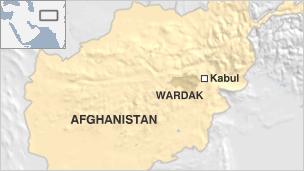US special forces Afghan helicopter downed 'by Taliban'
- Published
BBC's Quentin Sommerville in Kabul said the crash was a very significant loss for the international mission in the country
Thirty US troops, said to be mostly special forces, have been killed, reportedly when a Taliban rocket downed their helicopter in east Afghanistan.
Seven Afghan commandos and a civilian interpreter were also on the Chinook, officials say.
US sources say the special forces were from the Navy Seal unit which killed Osama Bin Laden, but are "unlikely" to be the same personnel.
This is the largest single US loss of life in the Afghan conflict.
The numbers of those killed have now been confirmed by the Nato-led mission in Afghanistan.
The Chinook went down in the early hours of Saturday in Wardak province, said a statement from President Hamid Karzai's office.
It was returning from an operation against the Taliban in which eight insurgents are believed to have been killed.
A senior official of President Barack Obama's administration said the helicopter was apparently shot down, Associated Press news agency reports.
An official with the Nato-led coalition in Afghanistan told the New York Times the helicopter was hit by a rocket-propelled grenade.
The BBC's Quentin Sommerville in Kabul says it is rare for the Taliban to shoot down aircraft.
The Taliban say they have modified their rocket-propelled grenades to improve their accuracy but that may not be true, our correspondent says.
'Enemy activity'
"The president of the Islamic Republic of Afghanistan expresses his sympathy and deep condolences to US President Barack Obama and the family of the victims," the statement from President Karzai said.
President Obama, too, issued a statement paying tribute to the Americans and Afghans who died in the crash.
"We will draw inspiration from their lives, and continue the work of securing our country and standing up for the values that they embodied. We also mourn the Afghans who died alongside our troops in pursuit of a more peaceful and hopeful future for their country," the statement said.
Reports say more than 20 of the US dead were Navy Seals.
A US military source has confirmed to the BBC that they were from Seal Team Six - the same unit which killed Bin Laden in Pakistan in May.
However, US officials have told both the BBC and AP they do not believe that any of those who took part in the Bin Laden operation were on the downed helicopter.
The size of Team Six, an elite unit within the Seals, which is officially called the Naval Special Warfare Development Group, is not known.
Several air force personnel, a dog and his handler, a civilian interpreter, and the helicopter crew were also on board, AP reports.
The Nato-led International Security Assistance Force (Isaf) said it was mounting an operation to recover the helicopter and find out why it crashed. It said there had been "enemy activity in the area" where it went down.
A Taliban spokesman said insurgents had brought down the helicopter with a rocket after US and Afghan troops attacked a house in the Sayd Abad district of Wardak where insurgents were meeting late on Friday, Associated Press said.
Sayd Abad, near the province of Kabul, is known to have a strong Taliban presence.
A Wardak government spokesman quoted by AFP news agency agreed with this, saying the helicopter had been hit as it was taking off.
A local resident told the BBC Pashto service a rocket had hit the helicopter.
"What we saw was that when we were having our pre-dawn [Ramadan] meal, Americans landed some soldiers for an early raid," said Mohammad Wali Wardag.
"This other helicopter also came for the raid. We were outside our rooms on a veranda and saw this helicopter flying very low, it was hit by a rocket and it was on fire."

There are currently about 140,000 foreign troops - about 100,000 of them American - in Afghanistan, fighting the Taliban insurgency and training local troops to take over security.
All foreign combat forces are due to leave Afghanistan by the end of 2014 and some troop withdrawals have already taken place.
Nato has begun the process of handing over control of security in some areas to local forces, with Bamiyan becoming the first province to pass to Afghan control in mid-July.
An increase in US troop numbers last year has had some success combating the Taliban in the south of Afghanistan, but attacks in the north, which was previously relatively quiet, have picked up in recent months.